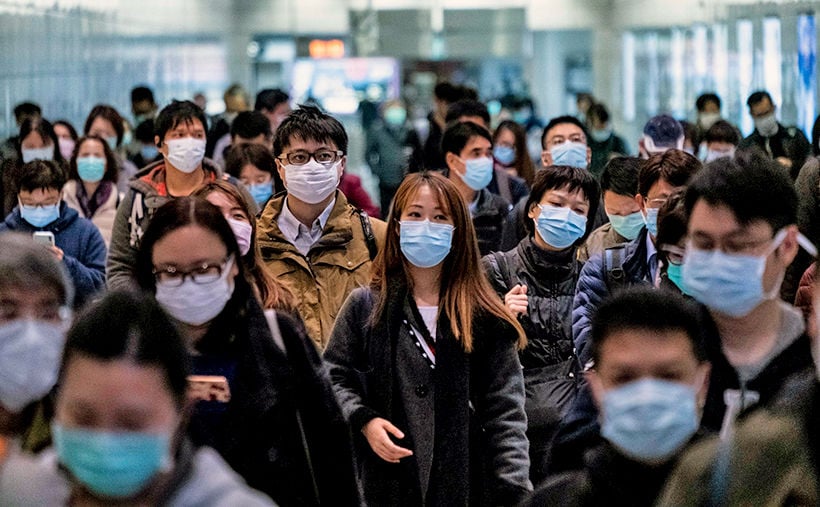Top 10 things you should know about Covid-19 coronavirus

We are all in unchartered territory as the Covid-19 coronavirus starts to impact just about all aspects of our lives. The virus is here and is likely to spread further, making more people sick, some very sick and continue to kill others.
Currently the death rate, after more than 2 months of statistics, is around 4%. But epidemiologists say that this will likely be lower in the long run. Still, it’s a sobering statistic and makes the outbreak profoundly different from existing annual colds and flus. In fact comparing the Covid-19 coronavirus with the seasonal flu is irresponsible and inaccurate in just about every conceivable way. This outbreak is NOTHING like the seasonal flu.
Here are ten things important to recognise about the Covid-19 coronavirus pandemic. At the end is some sobering commentary from Michael Osterholm, an American public-health scientist and a biosecurity and infectious-disease expert, speaking with Joe Rogan. We’d recommend you watch it.
1. Slow down infections
The best advice is to delay getting infected, as long as possible. As the years go it is likely that a large proportion of the world will be confronted with a bout of Covid-19. The younger and the healthy appear to get through their infection and symptoms without major complications. The older, and those with underlying illnesses, are at much greater risk.
But delaying your exposure will keep hospital beds available for the critically ill. There is little that can be done, at this stage, to limit further transmission on a global scale. There are now cases in just about every country in the world. But we can slow down the infection rate by applying social distancing, maintaining good hygiene, washing hands regularly and avoiding contact with large groups of people.
We should be doing ALL that, now.
By delaying your possible infection, you also move your case further along the knowledge-curve as better treatments, and even a vaccine down the track, become available The reality is that a fully-tested and reliable vaccine is a year away, at least). Getting a really bad flu, or major respiratory illness, and having to go hospital at any time in your life is bad. Having to go to hospital when the health system is overloaded and stressed is your worst-case-scenario.
Flattening the infection curve is a big deal and the most important intention of any response to the virus.
2. This IS a serious issue
As if this needs to be explained. If the actions of world governments and the plunge in stock markets isn’t enough, then the current death rate or the stress caused to your local community should be ample evidence of the seriousness of this global pandemic.
The potential of this virus to spread quickly, and broadly, is uniquely different from earlier viruses. That ‘carriers’ can be asymptomatic (without symptoms) for up to 1 week before showing symptoms (the average is about 4 days at the moment), is a sinister and unique part of this virus’s clever design. It makes containment particularly difficult, or even impossible.
3. Closing borders and closing schools doesn’t work
But it will likely slow, but not stop, the spread of the disease. Epidemiologists have explained that all the government closures of borders and schools simply “kicks the can down the road”. But that does, perhaps, mitigate the overwhelming of hospitals in this early, critical, phase.
The closing of schools can also put additional pressure on vital healthcare workers. In the UK some 34% of nurses have school-age children and say that their children being sent home will cause disruption to their work and care for sick patients.
4. Washing your hands will help but social distancing is more important
Yes, wash your hands (for at least 20 seconds) and wash down surfaces around the office and home. But clean hands won’t stop you breathing in the virus. Current evidence suggests that the Covid-19 virus is airborne. Keeping your distance from potential carriers is your very best defence. Self-quarantine is such a useful strategy because it allows you to stay away from others.
And we need to get used to changes in habits like hugging and shaking hands as greetings. By hugging others at this time is not being friendly, it’s potentially dangerous. All you’re doing by continuing these courtesies at the moment is advertising to others your ignorance about the situation. Luckily in Thailand we have a perfect solution, the wai. Practice it and use it.
5. Remain informed and don’t spread rumours
Facts are really important during this time. Reliable media is your best friend. If you read something that sounds either exaggerated, fanciful or unlikely, check the source. Who is reporting the news? Who are they quoting? The vast majority of mainstream media are taking a responsible stand at this time recognising the vital importance and accuracy of the information they post.
There is no shortage of rubbish circulating in social media that spreads even faster than the virus. Sharing this information is irresponsible and probably illegal.
6. Change your work and daily habits
If you can work from home, do so. Or at least put strategies in place where you can effectively continue your work and remain productive. There are a number of online tools that will allow your employer to keep tracking your work whilst working remotely. Discuss the options with your employer and make preparations.
We still have to get out and shop but maybe do your grocery shopping once a week instead of every few days. And shop early in the morning or late at night when there are less people around. You’ll probably zoom through the cashier as well.
Obviously avoid public transport. Travel alone or not at all.
7. This is NOT about politics
No matter who you vote for, what you think about your politicians, or how willing you are to criticise you government’s response to this emergency, move on. It’s clear some politicians have tried to leverage their statements and response in line with their political ideology. But getting annoyed about them at this moment won’t protect you.
Whatever your provincial response has been, no matter what your government might be rolling out, your best response is what YOU do, right now. Don’t assume your council or national government is going to save you from becoming infected. Protecting your family and your friends is YOUR responsibility, now. Don’t wait for your elected leaders to save you in a wave of political rhetoric.
8. The outbreak of the virus will be matched by an outbreak of debt and despair
Companies will fail and many, many people will lose their jobs. The social and financial impact of this pandemic will, in many ways, be greater than the medical impact. In protecting yourself from the virus, you should also consider the disruption to business that could last up to the end of this year. Every person and every business will have their own circumstances. But, again, don’t rely on your company to keep employing you as they battle to remain functioning. Make preparations to put yourself in the best situation possible if the worst situation occurs.
9. Covid-19 not like a mild flu
This comforting factoid floating around the channels is inaccurate. Covid-19 attacks the respiratory system – your lungs. The symptoms usually involve a persistent cough. Most younger people have, anecdotally, sailed through the symptoms without major drama or need for serious medical intervention. But we also know that older people, and those with underlying diseases, have suffered serious illness, and death.
Then there’s around 10-20% of patients that do develop serious symptoms, often requiring hospitalisation and even the assistance of serious drugs and ventilators. These are the the ones that are currently overwhelming public health systems around the world. Those hospital beds aren’t full of people with ‘mild’ symptoms.
Your very best strategy to avoid serious complications is to ensure that your immune system is healthy. Eating a good diet, getting plenty of sleep, maintaining some exercise… blah, blah. you know what you need to do. If you are a smoker, now is a good time to stop.
10. This will all be over at some point
This is different and it is unprecedented. There have been viral outbreaks in the past. Some have had savage consequences. Others less-so. But the Covid-19 outbreak is like nothing we’ve seen before. That it happens during a time of huge social media communication is a double-edged sword. We know more, a lot more, about the daily progress of this virus. And we’ve been provided with more information that we could even consume on the matter. But there’s also a lot of rumours and false facts that have circulated, cluttering up the communication lines with unhelpful nonsense.
But there will be an eventual flattening out of the infection curve and then a reduction in new cases. And then recovery.
But we will all emerge from the pandemic a little humbled and bruised. What you do NOW, preparing for the impact on your family, your friends and your community, will profoundly affect how you will emerge when the peak of the situation passes.
Stay safe, don’t panic and stay informed.
Latest Thailand News
Follow The Thaiger on Google News:


























